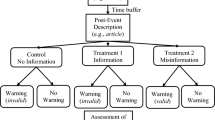Abstract
The online proliferation of misinformation is pressing both society and business actors to provide effective mitigation strategies. The current study aims to bring more clarity to the common belief that engagement with reliable data will lead to disengagement from inaccurate information. The proposed experiment on 290 volunteers simulates the process of reading a narrative on terrorism — under misinformation or accurate information — followed by exposure to official data. Participants that consulted official data following exposure to misinformation (N = 43) did not differ from participants exposed solely to misinformation in regard to the level of worry about terrorism (N = 43). Similarly, there was no significant difference between misinformation (N = 43) and accurate (N = 47) information groups in the level of worry about terrorism after consulting official data. However, the role of media engagement has proven essential: when presented with accurate information followed by reliable data, participants’ worry about terrorism decreased significantly, but only for those highly engaged with news concerning terrorism. Similarly, when presented with misinformation followed by reliable data, participants’ worry significantly increased, but only for those not engaged with terrorism-related news. Further analyses revealed a polarization effect within the group of participants exposed to inaccurate information and reliable data, with the engagement with terrorism-related news and conservatism as predictors. These findings broaden the literature on strategies to tackle misinformation, by clarifying the role of fact-checking and narrative unpacking.




Similar content being viewed by others
Data Availability
The date associated with this manuscript is available at https://osf.io/xtkv7.
Code Availability
Not applicable.
References
Ahler, D. J. (2014). Self-fulfilling misperceptions of public polarization. The Journal of Politics, 76(3), 607–620. https://doi.org/10.1017/S0022381614000085
Allcott, H., & Gentzkow, M. (2017). Social media and fake news in the 2016 election. Journal of Economic Perspectives, 31(2), 211–236. https://doi.org/10.1257/jep.31.2.211
Barfar, A. (2019). Cognitive and affective responses to political disinformation in Facebook. Computers in Human Behavior, 101, 173–179. https://doi.org/10.1016/j.chb.2019.07.026
Born, K., & Edgington, N. (2017). Analysis of philanthropic opportunities to mitigate the disinformation/propaganda problem. Hewlett Foundation, available at: Www. Hewlett. Org/wp-content/uploads/20, 17(11), https://doi.org/10.1108/OIR-02-2018-0065
Boxell, L., Gentzkow, M., & Shapiro, J. M. (2017). Greater internet use is not associated with faster growth in political polarization among US demographic groups. Proceedings of the National Academy of Sciences, 114(40), 10612–10617. https://doi.org/10.1073/pnas.1706588114
Buchanan, T., & Benson, V. (2019). Spreading disinformation on Facebook: Do Trust in message source, risk propensity, or personality affect the organic reach of “fake news”?. Social media+ society, 5(4), 2056305119888654, https://doi.org/10.1177/2056305119888654
Cesario, J. (2014). Priming, replication, and the hardest science. Perspectives on Psychological Science, 9(1), 40–48. https://doi.org/10.1177/1745691613513470
Cook, J., Lewandowsky, S., & Ecker, U. K. (2017). Neutralizing misinformation through inoculation: Exposing misleading argumentation techniques reduces their influence. PLoS One, 12(5), e0175799. https://doi.org/10.1371/journal.pone.0175799
DellaVigna, S., & Kaplan, E. (2007). The fox news effect: Media bias and voting. The Quarterly Journal of Economics, 122(3), 1187–1234. https://doi.org/10.1162/qjec.122.3.1187
Europol. (2019). TE-SAT 2019: EU terrorism situation and trend report 2008. Europol
Everett, J. A. (2013). The 12 item social and economic conservatism scale (SECS). PLoS One, 8(12). https://doi.org/10.1371/journal.pone.0082131
Faris, R., Roberts, H., Etling, B., Bourassa, N., Zuckerman, E., & Benkler, Y. (2017). Partisanship, propaganda, and disinformation: Online media and the 2016 US presidential election. Berkman Klein Center Research Publication, 6
Flaxman, S., Goel, S., & Rao, J. M. (2016). Filter bubbles, echo chambers, and online news consumption. Public Opinion Quarterly, 80(S1), 298–320. https://doi.org/10.1093/poq/nfw006
Frederick, S. (2005). Cognitive reflection and decision making. Journal of Economic Perspectives, 19(4), 25–42. https://doi.org/10.1257/089533005775196732
Friggeri, A., Adamic, L., Eckles, D., & Cheng, J. (2014, May). Rumor cascades. In proceedings of the international AAAI conference on web and social media (Vol. 8, no. 1)
Gentzkow, M., & Shapiro, J. M. (2011). Ideological segregation online and offline. The Quarterly Journal of Economics, 126(4), 1799–1839. https://doi.org/10.1093/qje/qjr044
Goldstein, D. G., & Rothschild, D. (2014). Lay understanding of probability distributions. Judgment & Decision Making, 9(1)
Guess, A., Nyhan, B., & Reifler, J. (2018). Selective exposure to misinformation: Evidence from the consumption of fake news during the 2016 US presidential campaign. European Research Council, 9
Harper, C. A., & Baguley, T. (2019). “You are fake news”: Ideological (a) symmetries in perceptions of media legitimacy” PsyArXiv preprint. https://doi.org/10.31234/osf.io/ym6t5
Helberger, N., Karppinen, K., & D’acunto, L. (2018). Exposure diversity as a design principle for recommender systems. Information, Communication & Society, 21(2), 191–207. https://doi.org/10.1080/1369118X.2016.1271900
Ksiazek, T. B., Peer, L., & Lessard, K. (2016). User engagement with online news: Conceptualizing interactivity and exploring the relationship between online news videos and user comments. New Media & Society, 18(3), 502–520
Lagun, D., & Lalmas, M. (2016, February). Understanding user attention and engagement in online news reading. In proceedings of the ninth ACM international conference on web search and data mining (pp. 113-122), 10.1145/2835776.2835833
Lazer, D. M., Baum, M. A., Benkler, Y., Berinsky, A. J., Greenhill, K. M., Menczer, F., et al. (2018). The science of fake news. Science, 359(6380), 1094–1096. https://doi.org/10.1126/science.aao2998
Lewandowsky, S., Ecker, U. K., Seifert, C. M., Schwarz, N., & Cook, J. (2012). Misinformation and its correction: Continued influence and successful debiasing. Psychological Science in the Public Interest, 13(3), 106–131. https://doi.org/10.1177/1529100612451018
Martens, B., Aguiar, L., Gomez-Herrera, E., & Mueller-Langer, F. (2018). The digital transformation of news media and the rise of disinformation and fake news, https://doi.org/10.2139/ssrn.3164170
Martin, G. J., & Yurukoglu, A. (2014). Bias in cable news: Real effects and polarization. National Bureau of Economic Research. https://doi.org/10.1257/aer.20160812
Nellis, A. M., & Savage, J. (2012). Does watching the news affect fear of terrorism? The importance of media exposure on terrorism fear. Crime & Delinquency, 58(5), 748–768. https://doi.org/10.1177/0011128712452961
Nyhan, B., & Reifler, J. (2010). When corrections fail: The persistence of political misperceptions. Political Behavior, 32(2), 303–330. https://doi.org/10.1007/s11109-010-9112-2
Pennycook, G., & Rand, D. G. (2019). Lazy, not biased: Susceptibility to partisan fake news is better explained by lack of reasoning than by motivated reasoning. Cognition, 188, 39–50. https://doi.org/10.1016/j.cognition.2018.06.011
Pennycook, G., McPhetres, J., Zhang, Y., Lu, J. G., & Rand, D. G. (2020). Fighting COVID-19 misinformation on social media: Experimental evidence for a scalable accuracy-nudge intervention. Psychological Science, 31(7), 770–780. https://doi.org/10.1177/0956797620939054
Perse, E. M. (1992). Predicting attention to local television news: Need for cognition and motives for viewing. Communication Reports, 5(1), 40–49. https://doi.org/10.1080/08934219209367542
Peters, E., Slovic, P., Västfjäll, D., & Mertz, C. K. (2008). Intuitive numbers guide decisions. Judgment and Decision making, 3, 619–635
Renda, A. (2018). The legal framework to address" fake news": Possible policy actions at the EU level. European Parliament
Roets, A. (2017). ‘Fake news’: Incorrect, but hard to correct. The role of cognitive ability on the impact of false information on social impressions. Intelligence, 65, 107–110, https://doi.org/10.1016/j.intell.2017.10.005
Roozenbeek, J., & van der Linden, S. (2019). Fake news game confers psychological resistance against online misinformation. Palgrave Communications, 5(1), 12. https://doi.org/10.1057/s41599-019-0279-9
Silverman, C., & Singer-Vine, J. (2016) . Most Americans who see fake news believe it, new survey says. Buzzfeed. https://www.buzzfeed.com/craigsilverman/fake-news-survey?utm_term=.lazQnopg3#.tbR2yvrL6
Strömbäck, J., & Kiousis, S. (2010). A new look at agenda-setting effects—Comparing the predictive power of overall political news consumption and specific news media consumption across different media channels and media types. Journal of Communication, 60(2), 271–292. https://doi.org/10.1111/j.1460-2466.2010.01482.x
Sunstein, C. R. (2018). # republic: Divided democracy in the age of social media. Princeton University Press
Swire, B., Ecker, U. K., & Lewandowsky, S. (2017). The role of familiarity in correcting inaccurate information. Journal of experimental psychology: Learning, memory, and cognition, 43(12), 1948, https://doi.org/10.1037/xlm0000422
Tandoc Jr., E. C. (2019). The facts of fake news: A research review. Sociology Compass, 13(9), e12724. https://doi.org/10.1111/soc4.12724
Tandoc Jr., E. C., Lim, Z. W., & Ling, R. (2018). Defining “fake news” a typology of scholarly definitions. Digital Journalism, 6(2), 137–153. https://doi.org/10.1080/21670811.2017.1360143
Thompson, R. R., Jones, N. M., Holman, E. A., & Silver, R. C. (2019). Media exposure to mass violence events can fuel a cycle of distress. Science advances, 5(4), eaav3502, https://doi.org/10.1126/sciadv.aav3502
Toplak, M. E., West, R. F., & Stanovich, K. E. (2014). Assessing miserly information processing: An expansion of the cognitive reflection test. Thinking & Reasoning, 20(2), 147–168. https://doi.org/10.1080/13546783.2013.844729
Triberti, S., Durosini, I., & Pravettoni, G. (2021). Social distancing is the right thing to do: Dark triad behavioral correlates in the COVID-19 quarantine. Personality and Individual Differences, 170, 110453. https://doi.org/10.1016/j.paid.2020.110453
Tucker, J. A., Guess, A., Barberá, P., Vaccari, C., Siegel, A., Sanovich, S., ... & Nyhan, B. (2018). Social media, political polarization, and political disinformation: A review of the scientific literature. Political Polarization, and Political Disinformation: A Review of the Scientific Literature (March 19, 2018), https://doi.org/10.2139/ssrn.3144139
Tulving, E., & Schacter, D. L. (1990). Priming and human memory systems. Science, 247, 301–306. https://doi.org/10.1126/science.2296719
Van Duyn, E., & Collier, J. (2019). Priming and fake news: The effects of elite discourse on evaluations of news media. Mass Communication and Society, 22(1), 29–48. https://doi.org/10.1080/15205436.2018.1511807
Vosoughi, S., Roy, D., & Aral, S. (2018). The spread of true and false news online. Science, 359(6380), 1146–1151. https://doi.org/10.1126/science.aap9559
Wardle, C., & Derakhshan, H. (2018). Thinking about ‘information disorder’: formats of misinformation, disinformation, and mal-information. Ireton, Cherilyn; Posetti, Julie. Journalism,‘fake news’& disinformation. Paris: Unesco, 43–54
Wolverton, C., & Stevens, D. (2019). The impact of personality in recognizing disinformation. Online Information Review. https://doi.org/10.1108/OIR-04-2019-0115
Zhang, X., & Ghorbani, A. A. (2019). An overview of online fake news: Characterization, detection, and discussion. Information Processing & Management. https://doi.org/10.1016/j.ipm.2019.03.004
Funding
No funding was received for conducting this study.
Author information
Authors and Affiliations
Corresponding author
Ethics declarations
Ethics Approval
All procedures performed in studies involving human participants were in accordance with the ethical standards of the institutional and/or national research committee and with the 1964 Helsinki Declaration and its later amendments or comparable ethical standards.
Consent to Participate
Informed consent was obtained from all individual participants included in the study.
Consent to Publish
Not applicable.
Animal Rights
No animal studies were carried out by the authors for this article.
Conflict of Interest/ Competing Interests
The authors have no relevant financial or non-financial interests to disclose. On behalf of all authors, the corresponding author states that there is no conflict of interest.
Additional information
Publisher’s note
Springer Nature remains neutral with regard to jurisdictional claims in published maps and institutional affiliations.
Supplementary Information
ESM 1
(DOCX 11 kb)
Rights and permissions
About this article
Cite this article
Rosu, MM., Cosmoiu, A., Ianole-Călin, R. et al. When is reliable data effective? The role of media engagement in reducing the impact of fake news on worry regarding terrorism. Curr Psychol 42, 11460–11474 (2023). https://doi.org/10.1007/s12144-021-02427-7
Accepted:
Published:
Issue Date:
DOI: https://doi.org/10.1007/s12144-021-02427-7




